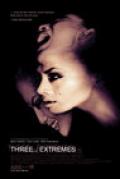Details

- Title
- Three...Extremes
- Director
- Fruit Chan, Chanwook Park, Takashi Miike
- Cast
- Miriam Yeung Chin Wah, Tony Leung Ka Fai, Ling Bai, Byung-hun Lee, Hye-jeong Kang, Won-hie Lim, Kyoko Hasegawa, Atsuro Watabe
- Length
- 125 min.
- Released
- 2004
Review
Extreme One: Fruit Chan's Dumplings (3)
The Christopher Doyle cinematography holds the interest for a while, but eventually grows to seem like Doyle-by-the-numbers: The elegance of the opening shots quickly recedes into cookbook short focus portraits. But really everyone knows that he hasn't made a good movie since Happy Together, right?
The story has some insightful comments to make about Chinese society, and a few more that apply to society in general, but ends up seeming silly and dull for as extreme as its subject matter intends it to be. Abortion and cannibalism are easy fallbacks for people looking for a superficial shock, and this never really gets beyond them. Ultimately the movie is pretty in fits and dull around with some few moments of interest.
Extreme Two: Chanwook Park's Cut (5)
Chanwook Park has the audacity to out-style C. Doyle with this unrestrained revenge comedy. It is a very different kind of style, all mise-en-scene calmly organized with obsessive patterns. This might be distracting or counterproductive if the film were more substantial, but it is not. It needn't be.
The story follows a successful Korean horror director. He is knocked out in his home and taken to a set (that looks exactly like his home) by a disgruntled bit actor. His wife is strung up like a marionette to sit at the piano. His hands are bound and he is attached to the wall by a long, thick band of elastic. The actor tells the director that he is going to chop off one of the wife's fingers every five minutes unless the director strangles a child that is also bound and gagged in the room.
Yes, the premise is very much like that of Saw. The difference, why this is good and Saw is useless, is that Park realizes the great comic potential in this situation. Cut is played like a depraved Laurel and Hardy routine mixed with a zany remake of his own Oldboy. Or, like I already said, like a short, funny version of Saw that doesn't suck.
The ending is a little weak, but you know how Park is with endings (see: Oldboy). The fun is in getting there.
Extreme Three: Takashi Miike's Box (7)
I'm pretty sure this is the moment that Takashi Miike becomes the world's greatest living director. Following on the heels of the mediocre Dumplings and the over-the-top Cut, Box is at the same time restrained almost to the point of being inert and pulsing with riviting vitality. A laser-beam fever-dream of sublimation and imperfect repression, the film is sturctured as a series of overlapping half-remembered dreams always in the process of waking, but never conscious.
As young children, the heroine and her sister were contortionists in their father's carnival magic act. He abused one and doted on the other. The heroine is haunted by the memory of unintentionally killing her sister. Miike builds a purely filmic portrait of psychosis that has rarely been equalled for style or grace. And while it never moves with anything other than calm deliberation, Box has a careful economy to it, never lingering a second too long.
Some fuss has been made about what seems to be an unnecessary twist ending. It is neither a twist nor an end, just another roiling convective vector surfacing from the heroines subconscious.
In defense of what might seem like a pointlessly baiting thesis: who else is there?
Wong Kar-Wai? Maybe in 1996 he'd have had a legitimate claim to the title.
Hirokazu Kore-Eda? He may be, on the strength of his last two movies, part of an elite upper echelon of filmmakers working today, but he'll have to build a more substantial body of work to be considered for the title.
Rob Zombie? Well, Devils Rejects may have been good, but this is still a joke.
George Romero? I wish, but no.
Quentin Tarantino doesn't even deserve to be on the list of people who are not the best director, but I figure I've got to mention him, since everybody else does. All the time.
Also not:
Werner Herzog (although he did make one of the best movies of the year)
Michael Gondry (who is better than Spike Jonze)
David O Russell
Guy Maddin
Martin Scorsese
Sorry.
In retrospect it seems almost like an inevitability that Miike would become a great director. Working at a furious pace of eight or nine movies a year, he couldn't help but develop a singularly complete personal filmic toolkit.
Here we are in 2005, hearing that "if you had predicted that an exuberant pair of low-budget gorehounds (Sam Raimi and Peter Jackson) would become the two hottest directors in Hollywood, you would have been fitted for a straitjacket." (Jim Ridley, City Pages, review of Dead Alive) But that's old news. I'm here to give you the cutting edge:
Takashi Miike is the best director in the world.
- Rating
- 5/8
- Reviewer
- Pat Jackson
- Published